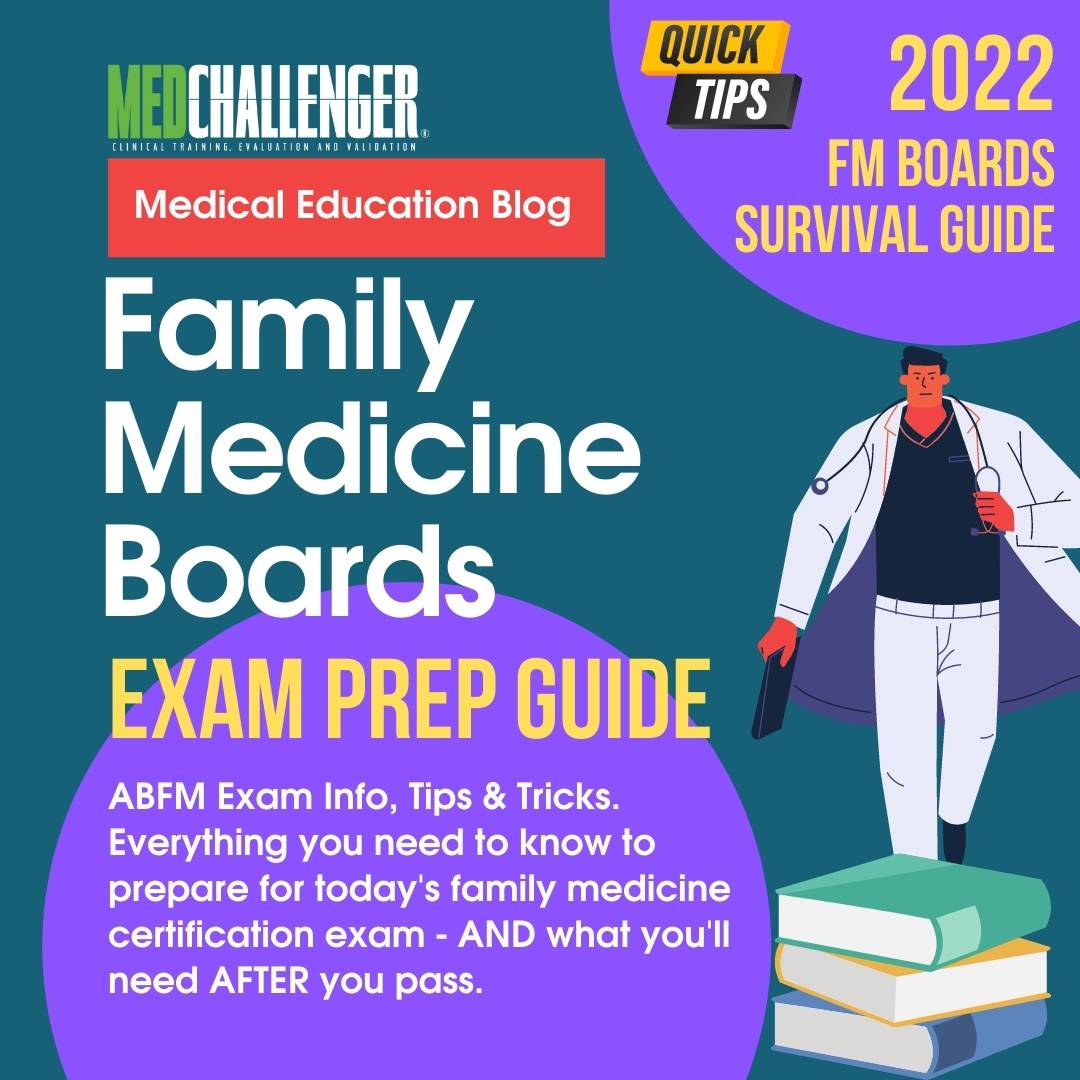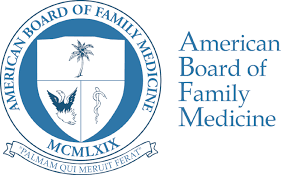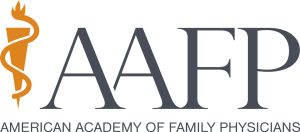How To Prepare for Family Medicine Boards (8 Tips to Ace ABFM Exams)
How to prepare for your family medicine board exam. ABFM study guide. How to pass the ABFM board exam. ABFM exam tips.
< All Posts
Share this article
Subscribe
Subscribe

Exam time is approaching, and you're wondering how to prepare for Family Medicine Boards. Let Med-Challenger help you with that! This family medicine board review study guide is full of tips, tricks, and valuable insight into the art of family medicine board prep and the inner-workings of the exam itself.
Follow these steps and you'll likely pass - and with a higher score!

ABFM Certification Exam Dates
Standard ABFM Exam Dates (Certification)

Other Family Medicine Exam Dates:
- In-training exam: October 22-31, 2025
Other Family Medicine Certification Requirements:
- Knowledge Self-Assessment (KSA): Either complete KSA topic-based modules annually, or complete CKSA questions sets quarterly for one year.
- Professionalism
- Family Medicine CME
- State CME
Preparing for Family Medicine Boards
How to Prepare for and Pass the ABFM exam
1. Understand the Structure of the Exam
Step one: Know what material is going to be covered in the exam.
ABFM publishes a content blueprint of the material that will appear on the exam, the primary medical content categories of the blueprint are shown below. This is how we determine which material appears in ABFM board exam simulations.
The subject composition is as follows:
12% Cardiovascular8% Endocrine
7% Gastrointestinal
3% Hematologic/Immune
6% Integumentary
12% Musculoskeletal
3% Nephrologic
3% Neurologic
9% Nonspecific
7% Psychogenic
4% Reproductive - Female
1% Reproductive - Male
13% Respiratory
2% Special Sensory
5% Population-based Care
5% Patient-based Systems
This includes topics such as biostatistics and epidemiology, evidence-based medicine, prevention, health policy and legal issues, bioterrorism, quality improvement, and geographic/urban/rural issues.
This includes topics such as clinical decision-making, communication and doctor patient interaction, family and cultural issues, ethics, palliative care, and end-of-life care.
Selected from seven possible choices at the time of the examination.
2. Know What to Expect on Exam Day
The one-day Family Medicine Certification Examination is divided into four separate sections of equal length and 100 minutes of pooled break time is available to be used between sections.
|
Exam Section |
Exam Section Format |
Time Allotted |
|---|---|---|
|
Section 1 |
75 Multiple Choice Questions |
95 Minutes |
|
Section 2 |
75 Multiple Choice Questions |
95 Minutes |
|
Section 3 |
75 Multiple Choice Questions |
95 Minutes |
|
Section 4 |
75 Multiple Choice Questions |
95 Minutes |
It is administered and proctored by staff at Prometric in approximately 350 locations around the United States and 180 international locations.
You do not need to have extensive familiarity with computers, but you should have experience with the use of a computer keyboard and mouse. Computer-based testing functions include the ability to navigate forward and backward through the examination, mark items for further review, highlight/strikeout question content, review answered, unanswered and marked items.
A listing of completed questions, incomplete questions, and marked items may be accessed at any time during the examination for the currently active section. You must review or change items prior to the time expiration for each section. Once you end an exam section, or the exam has timed out, you cannot return to the questions in that section. The computer-based examination contains a clock showing the time remaining in the top center of the exam screen.
3. Plan Out a Study Strategy
Take the time to assess the content you need to cover, and portion it out into manageable increments. Once you’ve grasped the breadth of the material, schedule times throughout your day dedicated solely to the topics and sections you’ve chosen to focus on. Setting a strict schedule and mapping out a plan of attack from the get-go will not only help you manage time and stress, it also ensures that you cover all relevant material.
Starting with topics that are familiar to you will help get you started and reinforce what you know, as well as familiarize you with your study habits.
10-14 hours per week for 3 months.
It's highly recommended to spend 10-14 hours a week for three or more months. Take a practice exam simulation as see where your weaknesses are. Work through the individual topics of difficulty to master them, then re-assess overall knowledge with larger exam simulations. The best FM board reviews are built for this.
4. Find a Smart ABFM Question Bank
Feedback from successful examinees suggests that seminars are not very useful. Instead, we recommend you choose a family medicine board review course that challenges you and requires your active participation.
Exposing yourself to practice exams early on will warm you up to the content you should expect to see on the exam, as well as help you assess your strengths and weaknesses. Be sure your Family Medicine study guide is mapped to the ABFM Blueprint and offers case-based questions that emulate the Q&A format seen on the actual exam.
Things to keep in mind when choosing a Family Medicine board review course: As far as board review questions and practice exams go, consider quality as well as the quantity. Insist upon a review that offers thorough, detailed, case-based questions that require involved study and active reading. This is the kind of quality content you're most likely to retain long-term.
Look for lasting value. Once certified, you'll have annual MOC and CME requirements to fulfill. The ability to earn continuing medical education credits while working through a review product is one of the main added values to pass-guaranteed board reviews.
Finding the best family medicine board review is key and articles such as What is the best Family Medicine Question Bank can help. Med-Challenger is a leader in online medical education. Boasting over 3000 detailed, challenging case-based questions following the ABFM exam blueprint, built-in Family Medicine CME & ABFM MOC resources, and a 100% pass guarantee, you can't go wrong.
Keep CME and MOC in mind.
Premier ABFM review packages also provide the ability to satisfy AAFP CME requirements - while you study.
5. Practice & Re-Practice
I start this tip off with a word of advice: As you work your way through review courses and practice exams, expect to fail. Answering incorrectly may be one of the most effective learning tools at your disposal, as it requires remediation, which in turn reinforces learned information and improves recall through active engagement.
“The only real mistake is the one from which we learn nothing.” - Henry Ford
Never expect to get by knowing only the bare minimum. Simply working your way through all content areas relevant to the ABFM Exam Blueprint will not be enough. In times of stress, you don't rise to the occasion - you fall to your highest level of preparation. Go back - do it again. The goal is to assess your strengths and weaknesses. Identifying your knowledge gaps early in the process frees up time for the actual study and review.
6. Identify & Attack Weak Areas
Once you've worked your way through the entirety of your study material several times and familiarized yourself with what areas you are and are not confident in, it's time to focus on the relevant material with which you are least comfortable and familiar.
Consider leaning on an adaptive assessment / prescriptive learning platform, such as Med-Challenger. With adaptive learning, not only are you assured to properly utilize all materials available, your time is spent exactly where it needs to be spent with every use, thereby producing a more effective individual review, with no wasted value, all in less time.
And remember: Always keep the ABFM Exam Blueprint in mind!
7. Treat Your Body Right
Preparing for FM boards will push you to your limits – you will be stressed, burnt out, and oftentimes exhausted. But like they say: It’s a marathon, not a sprint. In the long run, it won’t do you any good to sacrifice your physical and mental well-being.
At least every 3 hours, allow yourself a break to relax and unwind. Stay hydrated throughout the day. Remember to eat and nourish your body with healthy meal options. Exercise will help maintain healthy circulation and oxygenation to your brain. Take some time to meditate. And perhaps most importantly, maintain a healthy sleep schedule, especially the week before your exam.
8. During the Exam
The ABFM board typically uses multiple-choice questions that have one best answer. These items have a “stem” that presents the background information necessary for answering the question, which usually comes at the end of the stem. Be sure to read the stem carefully. As you proceed, make note of information that seems especially relevant. Read every answer option carefully. First use the process of elimination to filter out what you know is incorrect, and go from there.
Focus on addressing each question individually. Take a deep breath every now and then.
If you are completely stumped by a question or unsure you answered correctly, flag it and come back later. That having been said, also consider that the first thoughtful answer an examinee makes is usually the best answer. Second-guessing yourself is not likely to help your performance unless you fully realize that you've misread or misunderstood the question. This will help you maximize your time.
Long answers + language match = 😉
Board exam questions usually have tell-tale indicators of what the correct answer option is likely to be. Typically, correct answers tend to be a bit longer and echo language and exact details used in the question stem.
Recommended ABFM Board Review
The Best ABFM Exam Review Continues to Serve You
We understand the pressure you're surely experiencing knowing the fate of your future career rests on a comprehensive understanding of challenging exam material and peak test performance.
Here's the bottom line: You need to ace this exam, and we at Med-Challenger can make that happen. Our Family Medicine Board Review Course has everything you need to practice the various test scenarios you will face during your exam. It's 100% pass-guaranteed with a 99.8% pass-rate.
What's more? Our ABFM board review course also doubles as an ongoing knowledge refresh, MOC requirements aid, and CME credit resources - not just for today, but for every year of your future practice. Get started today!





